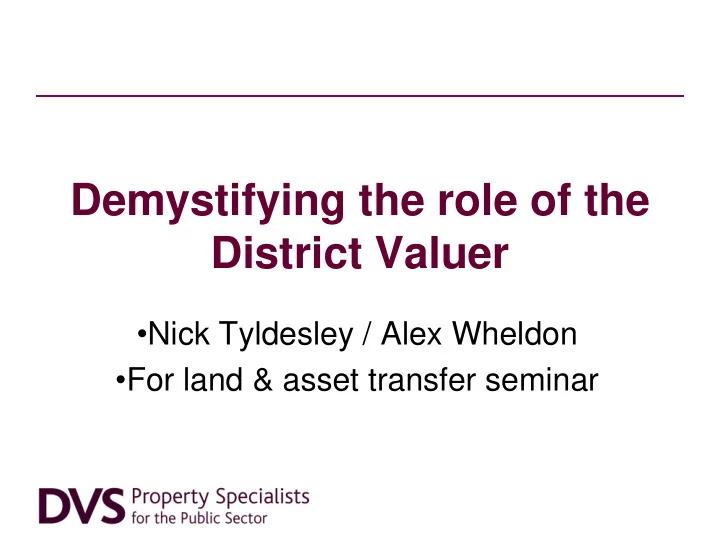

Demystifying the role of the District Valuer • Nick Tyldesley / Alex Wheldon • For land & asset transfer seminar
Slide 1) Overview of Session • Who, or what, is the District Valuer? • Methods of valuation • The valuation process • Land Transfer Protocol (LTP)
2) Who, or what, is the District Valuer? The “District Valuer” is now typically referred to as “DVS” (District Valuer Services), or the Valuation Office Agency (VOA); to which DVS forms a part of. As a public sector body DVS differs from private sector surveyors in two particular ways: 1. Cost recovery: When acting DVS simply seeks to cover its operating costs (staffing, accommodation, IT etc.). A profit is never sought. 2. Public purpose: DVS only acts for public (and third) sector clients, or where there is work of a public sector nature. We cannot act for private individuals or businesses.
Slide 3) Methods of valuation a) Market / Sales Comparison approach b) Income (investment) approach c) Residual approach d) Profits (trade) approach e) Cost (DRC / Contractors) approach
Slide 4) The valuation process a) What am I valuing? b) What valuation method/(s) is/(are) appropriate? c) What information do I need? d) Agreement of instructions e) Inspection, research, review & valuation f) Interactive communications g) Draft report h) Interactive communications i) Final report
Slide 5) Land Transfer Protocol (LTP) • LTP follows on from Welsh Government’s protocol concerning land disposals for affordable housing (28 June 2006) • LTP is a best practice guide for the disposal of land and property assets between public bodies in Wales • Many aspects of the LTP best practice guidance are also transferrable to other disposals by public bodies (e.g. the principles of Market Value, management of disposal process, overage / clawback considerations, state aid regulations etc.)
Questions? Thank you for listening Nick Tyldesley (03000) 507642 nick.tyldesley@voa.gsi.gov.uk
Recommend
More recommend